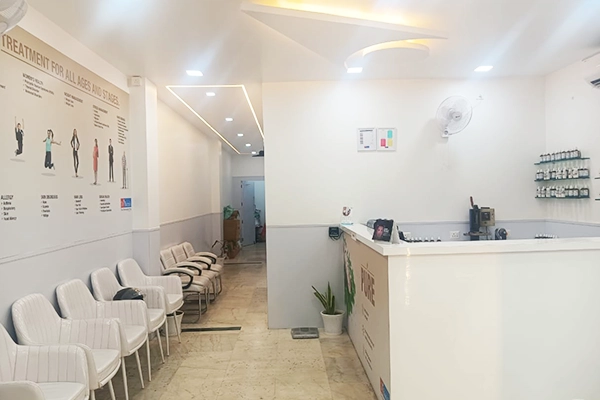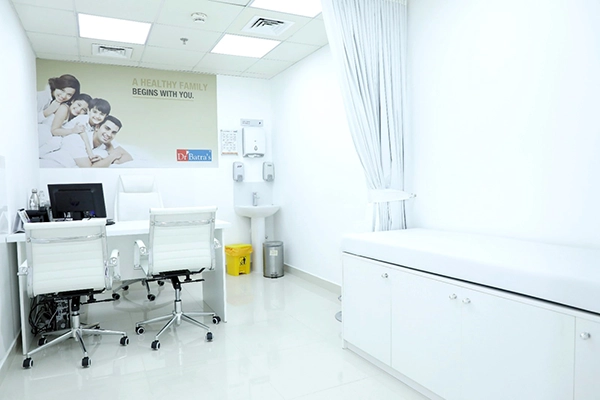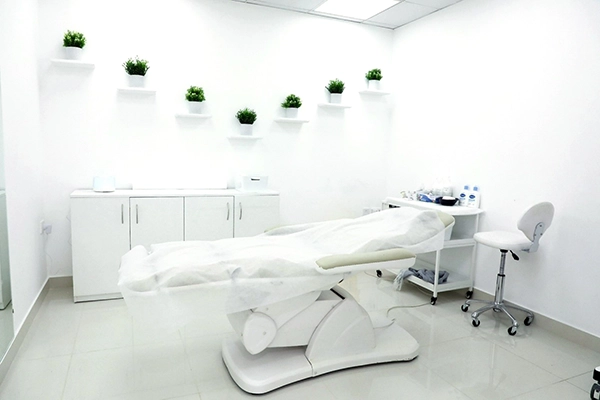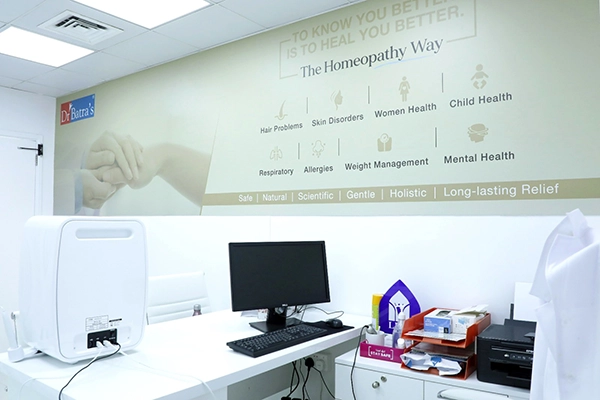Lichen Planus Treatment in Dubai & Abu Dhabi
Lichen Planus treatment is essential for those struggling with itchy, inflamed skin, painful oral lesions, or nail and scalp issues caused by this chronic condition.
At Dr Batra’s® UAE, we provide safe and effective treatment options designed to soothe symptoms, reduce flare-ups, and prevent long-term complications. Our holistic homeopathic approach targets the root cause of Lichen Planus and can provide relief without the risk of harsh side effects.
Book your consultation today and take the first step toward long term healthy skin.
Why Choose Dr Batra’s® Skin Clinics for Lichen Planus Treatment?
Trusted Experts in Skin Care
Dr Batra’s® has over 40 years of experience in treating chronic skin conditions like Lichen Planus. Our doctors specialise in homeopathy-based treatments which provide long-term relief with no harmful side effects.
Personalised Treatment Plans
We understand that every patient’s condition is unique. Our doctors conduct a detailed consultation to create a treatment plan tailored to your specific symptoms, triggers, and medical history.
Natural & Safe Healing
Unlike conventional steroid-based treatments, our homeopathic remedies work naturally to reduce inflammation, control itching, and prevent relapses without suppressing the immune system.
Holistic Approach to Skin Health
Our treatment goes beyond symptom relief. We help improve your overall skin health by addressing the root cause of Lichen Planus and guiding you with dietary and lifestyle changes for better long-term results.
Take control of your skin health today! Book a consultation with Dr Batra’s® and experience safe, effective relief from Lichen Planus.
Get Lichen Planus Treatment at Conveniently Located Clinics in Dubai & Abu Dhabi
Reviews of Dr Batra’s® Lichen Planus Treatment in Dubai & Abu Dhabi
Our Lichen Planus Treatment Process
Step 1: Personalised Consultation
Our doctors begin with a detailed skin assessment, reviewing your symptoms, medical history, and potential triggers like stress, allergies, or medications. This helps us understand the root cause of your Lichen Planus and design a customised treatment plan for your specific condition.
Step 3: Homeopathic Treatment
We prescribe safe and natural homeopathic medicines that help reduce inflammation, itching, and flare-ups. These remedies work by strengthening the immune system so that future recurrences of Lichen Planus can be prevented. Over the long term, you will find that this leads to your skin becoming healthier.
Step 4: Lifestyle & Dietary Guidance
Since Lichen Planus can worsen due to stress and certain foods, we provide personalised lifestyle recommendations to help manage triggers. Our experts guide you on skin-friendly diets, stress management techniques, and natural skin care tips.
Step 5: Ongoing Monitoring & Support
Our treatment is designed for long-term relief. We track your progress regularly and make adjustments as needed to ensure steady improvement and prevent relapses. Start your journey to healthier skin! Schedule a consultation with Dr Batra’s® today.
Diagnosis for Lichen Planus at Dr Batra’s®
Our doctors can mostly identify lichen planus based on visible signs & symptoms as well as your medical history. We also use advanced technologies such as 3D imaging device and Dr Batra’s® M.O.S.T for the analysis and evaluation of your skin condition and also to assess response to the treatment.
Our 3D imaging device uses an advanced optical technology developed by scientists at Trinity College, Dublin, Ireland. It allows skin to be viewed in 2 & 3 dimensions. and it can show your response to our treatment in the lower layers of your skin much before it can be seen by the naked eye.
M.O.S.T is a proprietary technology developed exclusively for Dr Batra’s® by Austrian scientists after 4 years of research. It helps our doctors to understand the progress of treatment for skin disorders, and helps measure the treatment outcome.
What is Lichen Planus?
Lichen Planus is a chronic inflammatory autoimmune disease that affects around 0.5% to 2% of the global population. It primarily appears as dark, flat-topped, itchy lesions on the skin, but it can also affect the scalp, nails, oral cavity, and genitals in many cases.
This condition is not contagious or infectious, meaning it does not spread through touch, saliva, or physical contact. However, it is long-lasting and unpredictable, with periods of remission (when symptoms disappear or reduce) and relapses (when symptoms flare up again).
Who Can Get Lichen Planus?
Lichen Planus can affect both men and women, though it is more common in females.
While it usually appears in young adults and middle-aged individuals, children and elderly people can also develop it.
The exact cause is not fully understood, but it is believed to be an immune system reaction, where the body mistakenly attacks healthy skin and mucous membranes.
If left untreated, Lichen Planus can lead to discomfort, scarring, and long-term pigmentation changes, making early diagnosis and treatment essential.
Lichen Planus Symptoms
Lichen planus can be easily identified in most cases because of the typical location of rashes and their 'violaceous' appearance.
The skin eruptions of lichen planus tend to involve the following areas:
The skin eruptions of lichen planus tend to involve the following areas:
Mucous membranes that line the mouth. nose, genitals (vagina / penis) and anus
The onset of eruptions can be sudden or gradual, and they show the following features:
- Rows or small clusters of flat-topped eruptions, usually a few millimeters in diameter;
- Violet colour of rashes in most cases; the colour may vary from purple to pink to red;
- Itching, which may vary from mild to severe;
- New eruptions may appear at the sites of minor skin injury, such as a superficial scratch (called as Koebner's phenomenon);
- In some cases, there may be thick, reddish-brown lesions that are covered with scales (called as hypertrophic lichen planus);
- When the rashes resolve, they leave behind dark brown or grey spots (hyperpigmentation marks);
- In cases of scalp involvement, there can be a development of scarring in the affected areas, leading to loss of hair; and
- Affected nails may develop pits and grooves.
Oral lichen planus has a typical presentation that involves the following:
- Small, pale, raised areas that form a lacy network on the inside of the cheeks, rarely involving the tongue (occasionally, the lesions may be red and shiny);
- Soreness, burning pain, tenderness, especially while having spicy foods;
- Dry mouth with metallic taste or blunted-taste sensation; and
- Painful, recurrent ulcers in the mouth.
People with long-term lesions of oral lichen planus are at a greater risk of developing malignancy (squamous cell carcinoma).
Causes of Lichen Planus
The exact cause of lichen planus is not well understood till date, but various theories exist on what can trigger this condition. Some of the commonly cited reasons include the following:
An allergic or immune reaction to a medication or other substance has been strongly associated as the cause for this condition. It is considered to be an auto-immune disease, in which the body's protective cells attack the body's own tissues mistaking them to be foreign in nature.
Certain cases have been linked to infections such as hepatitis C.
Intake of few drugs such as those containing arsenic, bismuth, gold quinacrine or quinidine (anti-malarial drug) non-steroidal anti-inflammatory drugs, can cause a reaction similar to the lichen planus rash.
Chemicals such as those used in the development of colour photographs can also produce a similar rash.
Intense and prolonged emotional stress due to grief, sadness, anxiety, etc., can trigger an abnormal functioning of the immune system that can lead to lichen planus.
Heredity is a common enough cause of lichen planus.
Amalgam dental fillings may trigger allergic reactions, giving rise to oral lesions of lichen planus.
Risk Factors of Lichen Planus
The exact cause of Lichen Planus remains unclear, but several factors may increase the risk of developing this condition:
- Age and Gender: Lichen Planus can affect individuals of any age, but it is more commonly observed in adults over the age of 40. Oral Lichen Planus, in particular, is more prevalent among women.
- Genetic Predisposition: A family history of Lichen Planus or other autoimmune diseases may increase susceptibility.
- Viral Infections: Certain viral infections, such as hepatitis C, have been associated with an increased risk of developing Lichen Planus.
- Medications: Some medications, including certain pain relievers and blood pressure drugs, have been linked to Lichen Planus-like reactions.
- Allergens: Exposure to certain allergens, such as metal dental materials, may trigger Lichen Planus in susceptible individuals.
- Stress: Emotional or physical stress has been identified as a potential trigger for Lichen Planus.
Potential Complications Caused by Lichen Planus
While Lichen Planus is generally not dangerous, certain complications can arise:
- Chronic Discomfort: Persistent itching and discomfort can affect daily activities and quality of life.
- Skin Changes: Lesions may cause pigmentation changes or scarring, particularly if scratched or irritated.
- Oral Issues: Oral Lichen Planus can lead to painful sores, making eating and speaking difficult.
- Hair and Nail Problems: Involvement of the scalp can result in hair loss, while nail involvement may cause thinning, ridging, or loss of nails.
- Increased Cancer Risk: Long-term erosive Lichen Planus, especially in the mouth or genital area, may slightly increase the risk of developing certain types of cancer.
When to See a Doctor for Lichen Planus
It is advisable to consult a healthcare provider if you experience:
- Persistent Symptoms: Itching, rash, or mouth sores that do not improve within a few weeks.
- Pain or Discomfort: Significant pain, especially in the mouth or genital area, affecting daily activities.
- Spread of Lesions: Rapid spreading of lesions or involvement of multiple body areas.
- Signs of Infection: Redness, swelling, pus, or fever accompanying skin lesions.
- Nail or Scalp Changes: Noticeable changes in nail appearance or patches of hair loss.
Early diagnosis and appropriate management can help alleviate symptoms and prevent potential complications associated with Lichen Planus.
Frequently Asked Questions about Lichen Planus
Is lichen planus contagious?
Lichen planus is not contagious. It does not spread with any kind of physical contact.
I have lichen planus on my left arm. Are there any possibilities of it getting spread to the other areas?
Yes, lichen planus may spread to one or more parts of the body.
My healthcare adviser said that I have got lichen planus because of some previous medication. I have changed the medication since, and yet, I see no signs of cure. Can homeopathy help?
Yes. Homeopathy can definitely help you, but you will need proper medication to treat it. It is believed that allergic reactions to certain medicines causes lichen planus. The reason for reappearing or visible marks is the auto-immune nature of this disease, in which the body's protective cells attack the body's own tissues.
Even if I start with homeopathy for my lichen planus, how much time will it take to completely treat this disease?
The response of the treatment depends on several factors, namely, the duration, your general health and the extent of its spread on your body
I am taking medication for hypertension. Do I have to stop it for treating lichen planus?
Generally, homeopathic medication does not interact with the conventional medicines. However, it is always advised to check with your healthcare provider for best results.
Can Lichen Planus be caused due to wrong food habits?
No, Lichen planus is not caused due to dietary habits.
Can lack of sleep cause Lichen Planus?
Lichen planus increases with stress, but there is no direct relationship between lack of sleep and lichen planus.
If I have lichen planus, will my child also get it?
Though lichen planus is known to have genetic causes, whether it will be transmitted to the next generation or not cannot be said with certainty.
Can Lichen Planus occur due to insect bites?
No, insect bites do not lead to lichen planus.








